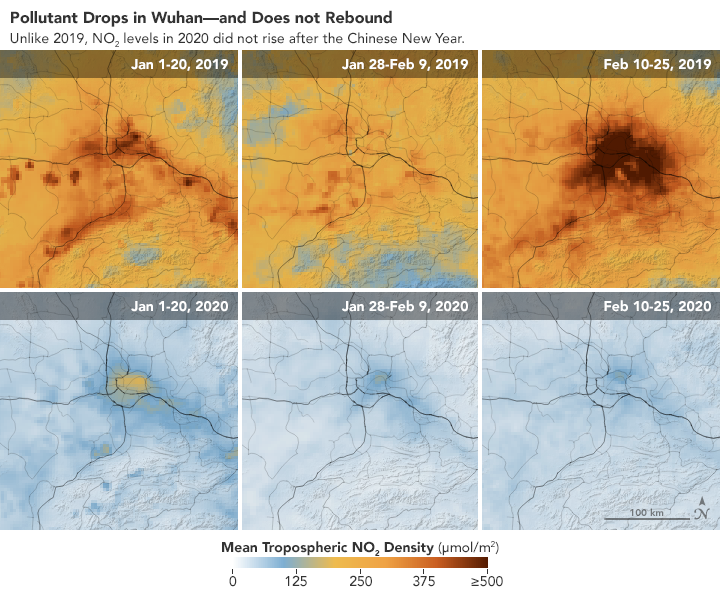What Can COVID-19 Teach Us About Addressing the Climate Crisis?
 The featured image is in the CC0 Public Domain.
The featured image is in the CC0 Public Domain.
In a matter of months, COVID-19 brought the global economy to a halt, curtailed air travel, and spurred lockdown measures, reducing air pollution and greenhouse gas emissions significantly. While occurring within a globally traumatic context, these side effects seem potentially hopeful for the environment. Although climate scientists report that COVID-19’s positive environmental impact is not likely sustainable, the policies currently in place still offer the potential to be leveraged in the fight against climate change. The world’s rapid reaction to COVID-19 has shown society’s capacity to transition to more sustainable options and drastically alter one’s lifestyle in a short amount of time, spurring the question of the viability in taking similar steps to address the climate crisis.
Weeks after COVID-19 broke out in Wuhan, NASA satellite images showed a dramatic decline in air pollution levels across China. According to NASA, there is strong evidence that the decrease in pollution was at least partly prompted by the economic slowdown caused by the pandemic. NASA scientists reported that reducing nitrogen dioxide and air pollution levels coincided with quarantine measures and restrictions imposed on transportation and business activities. Similar patterns occurred in Spain, where pollution levels have fallen by around 60 per cent in both Madrid and Barcelona. In fact, around the world, levels of harmful pollutants including nitrogen dioxide, carbon monoxide, and sulfur dioxide have plummeted as a result of COVID-19 shutdowns. Estimates by the International Energy Agency (IEA) indicate that the world’s carbon dioxide emissions could fall by eight per cent this year compared to last year as an impact of the pandemic.

How sustainable are the environmental impacts of COVID-19?
While an eight per cent reduction in carbon dioxide emissions is significant, climate scientists argue that COVID-19’s environmental impact came as a consequence of a drastic shift in lifestyle patterns and therefore would be difficult to sustain. Experts warn that decreasing CO2 emissions will not immediately lead to a drop in atmospheric levels of CO2 due to ecosystem degradation and the influence of climate change. In fact, atmospheric scientists have predicted a 2ppm increase in atmospheric CO2 concentrations in 2020–even with a ten per cent drop in annual emissions. Such patterns have occurred before; following the 2008 global financial crash, global CO2 emissions from fossil fuel combustion and cement production decreased by 1.4 per cent. After the initial aftermath, greenhouse gas emissions rebounded as the economy recovered, with global CO2 emissions rising by 5.9 per cent in 2010. Thus, the cumulative effect of carbon dioxide emissions have proven to be more impactful in driving global warming than any short-term reductions.
Although the current drop in emissions will not change the course of climate change on its own, COVID-19 still can have a longer term impact on sustainability. The pandemic has already generated behaviour change in work, the economy, and travel and could lead to locked-in behavioural change from social distancing and lockdown measures. For example, air travel fell by 95 per cent in the US, and the switch to telecommuting for many jobs has reduced unnecessary business travel and increased the viability of working remotely. Prior to the pandemic, studies showed that telecommuting took hold slower than many predicted when remote work technology first emerged. COVID-19, however, has forced a rise in investments in industries where telework is possible, which may lead towards a more permanent shift to telecommuting. Telecommuting behaviour has numerous positive impacts on the environment, including the potential to reduce network congestion and to mitigate pollution from vehicular emissions. The greater demand to produce local goods due to reduced international trade and economic activity is another trend that may outlive the pandemic. Other habits, such as creating less waste and using resources more efficiently due to shortages of products such as toilet paper or health supplies could also become more ingrained. Each of these behavioural changes, whose impact would be immensely positive in addressing climate change, may shift to permanent lifestyle changes as people adopt more sustainable crisis policies due to better convenience or cost.

While individual action in addressing climate change is important, the vastness of the scale of the climate crisis fundamentally requires the type of systemic change which can only come from political institutions and large corporations. The largest emitters of global greenhouse gases are power generation, heavy transport, and industry. Many view the economic fallout of the pandemic as an opportunity for the global economy to shift away from fossil fuels to cleaner energy alternatives, such as solar and wind. In order to leverage COVID-19 in the fight against climate change, post-pandemic recovery efforts must prioritize the “decoupling” of economic growth and emissions. The pandemic presents a tremendous political opportunity with regards to financial industry bailouts, which could be granted conditionally based on the requirement that banks divest from fossil fuels and instead invest in climate change mitigation efforts. The economic downturn caused by COVID-19 has underscored the potential for products which are environmentally-friendly and businesses which are more sustainable to have a better chance of long term investment. Furthermore, political leaders could ensure that economic stimulus programs prioritize investments in cleaner energy, and that assistance to industries, especially in carbon-intensive sectors, is conditional on drastic cuts in emissions.
COVID-19 has already demonstrated the power of solidarity in addressing a crisis. Moreover, the pandemic has proven that global governance has the capacity to work collectively. To mitigate the drastic effects of climate change, we must approach the climate crisis with the same urgency and solidarity as the COVID-19 crisis. Thus, joining together through collective citizen action and mobilizing to reshape institutions and political forces is vital to addressing our environmental crisis before it is too late.
The featured image is in the CC0 Public Domain.
Edited by Selene Coiffard-D’Amico.
